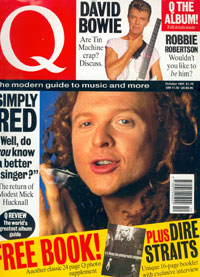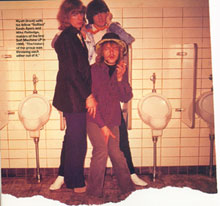| |
|
|
 Comrade
Softy - Q N°61 - October 1991 Comrade
Softy - Q N°61 - October 1991
COMRADE SOFTY
|

|
One-time drummer with
The Soft Machine, full-time member of the Communist Party,
Robert Wyatt's life was changed forever by the accident
that crippled him in 1973. But he kept on making music
- just about. "If anything," he tells Martin
Aston, "it helped me with the music, because the
hospital left me free to dream."
"I'M A MUSICIAN when I remember to be,"
Robert Wyatt confesses with an earnest tug at his straggly,
greying beard. "In fact, I don't even think about
it very often. l'm still mainly a jazz fan. If you could
get a job as one, l'd apply for it. 'I want you to listen
to the entire works of John Coltrane'. 'OK boss, sure..."'
Over the years, Wyatt has become accustomed to defending
his periodic absences from the music business. No two
or even three-year between albums hibernation here; give
or take the odd single or collaboration, since 1975's
Ruth Is Stranger Than Richard, it's taken him five years
to release a brace of singles and a film soundtrack, another
four to release a selfpenned album and a further six years
before the new LP, Dondestan, was ready to go.
"Basically, since the mid-'70s, you could say my preoccupations
have been, uh, political," Wyatt sighs, visibly uncomfortable
with the limited connotation of his words. "I've done
things like write articles for the Morning Star on topics
like Bulgarian folk music or foreign radio stations, or,
in the case of my last piece, Courtney Pine. I also write
letters to anyone who'll print them, and a lot who won't.
It doesn't sound like a lot, does it? l've probably turned
into the left equivalent of those anachronistic, retired
generals who dash off furious letters to the DaiIy Express
- except I write to the BBC..."
Wyatt's career would undoubtedly have taken a different
turn had he not, in 1973 , drunkenly fallen out of a fourth-floor
window at a party and broken his back. He'd left his Canterbury
school in 1960 without any qualifications but with an
overwhelming love of jazz - "I used to live precariously
in a kind of reconstructed ' 40s Harlem in my head and
only come out to eat and sleep" - which led him to the
drums and his first group, The Wilde Flowers. They soon
split in half, Pye Hastings and David Sinclair forming
Caravan while Wyatt teamed up with Mike Ratledge, Daevid
Allen and Kevin Ayers in Soft Machine.
|

> Zoom
|
| |
Robert Wyatt
in North London, Summer 1991.
Disabled by an accident in 1973, the one-time
Soft Machine drummer turned his attentions
to singing, to solo records like Shipbuilding,
and to politics. |
|
The Softies, as Wyatt calls them, joined Pink Floyd at
the forefront of Britain's new wave of psychedelic art-rockers,
quickly turning to free- form jazz-rock fusion. But there
were constant tribulations - "The history of the group,"
Wyatt says, "was throwing each other out of it" - and
Wyatt himself finally departed after the fourth album,
to record the largely instrumental solo album, The End
Of An Ear, after which he formed the equally experimental
Matching Mole, a group of "people I could talk to" and
who gave him the chance to sing in that characteristically
affecting, melancholic voice. (When asked now whether
he likes his voice, he dodges the question by self-deprecatingly
referring to one critic who likened it to " Jimmy Somerville
on valium.")
Matching Mole were already exploring Wyatt's melancholy
fusions when his accident occurred, committing him to
hospital for a year and depriving him of the bottom half
of his drum kit when he got out. Unable to maintain a
group from a wheelchair, Wyatt slowIy transformed the
music that was to become the group's third album, ending
up at Rock Bottom, a brave, deeply ironic title for a
work whose vivid, painful introspection and dreamy, musical
landscapes have been compared to those of Van Morrison's
Astral Weeks. "I was just relieved that I could do something
from a wheelchair," Wyatt confesses. "If anything, being
a paraplegic helped me with the music because being in
hospital left me free to dream, and to really think through
the music."
AT VIRGIN Records' suggestion - "because they had
this English idea, that to exist, you had to have a single"
- Wyatt recorded The Monkees' l'm A Believer and found
himself on Top Of The Pops when it scraped into the Top
30. But the follow-up, a cover of Chris Andrews's Yesterday
Man, was never officially released, because Virgin mogul
Richard Branson thought it "a bit too gloomy". Wyatt grins
at the memory.
1975's Ruth Is Stranger Than Richard was a jazzier, eclectic
affair, "more a case of roping in mates in and using their
stuff." The mates included exiled South African trumpeter
Mongezi Feza, guitarist Fred Frith and oblique strategist
Brian Eno, "with his toy machines, desperately hating
jazz," Wyatt fondIy recalls. And then silence. "Remember,
I started out as a drummer and became a singer, because
that was the only thing I could do properly once I found
myself in a wheelchair. l've never been a songwriter in
the sense of doing it all the time. When I have enough
ideas, I start working on them. There has to be a reason
for each record I make."
The reason behind his re-emergence in 1980 with four double-sided
cover-version singles was two-fold. Being chairbound knocked
the idea of the musician's life of travelling on the head,
but paradoxically opened up a broader worldview via books,
television and, in particular, radio, as Wyatt voraciously
tuned in to local, jazz and black music radio and further
afield to stations over the globe. Inspired by his wife
Alfie, depressed and angry about the continuing existence
of apartheid and what he perceived to be the NATO powers'
colonial attitude toward the Third World, Wyatt became
increasingly politicised, which culminated in his joining
the Communist Party.
|

Wyatt drumming with Soft Machine.
"It's
taken me this long to get over not being a
proper kit drummer. Now I enjoy the top half
of the kit."
|
"I wanted to be the kind of Communist that everyone moans
about. I wanted to stick to the party line and see what
I got out of it. I wanted to work more as a party member
who happened to sing than a musician who was dragging
politics into music. At the same time, I came to the conclusion
that rock, as an alternative culture and threat to the
old order, was becoming increasingly hard to take seriously."
Wyatt's covers were a fascinating selection from diverse
cultural contexts but unified by a folk/ethnic base and
spirit of resistance. Caimanera (or Guantanamera, as it
is better known in the West), virtually Cuba's national
anthem, and The Red Flag rubbed shoulders with an American
a cappella tribute to wartime Russia, Stalin Wasn't Stallin',
and a chilling version of Billie Holiday's Strange Fruit.
Compiled to make 1982's Nothing Can Stop Us, and free
of ego, fashion, patronage and sloganeering, the album
is arguably the best political record yet made.
By this point, Wyatt had recorded the Animals Film soundtrack
and relocated to the Catalan region of Spain, primarily
because the light was better for Alfie's painting, but
also as a necessary retreat from Blighty. Not that Wyatt
could keep his distance. In 1983, he was back on Top Of
The Pops with Shipbuilding, with its emotive, Falklands-inspired
Elvis Costello Iyrics.
Complete with a smoky, jazz-trio arrangement, Shipbuilding
was tailor-made for Wyatt's plaintive croon: "They sent
me a cassette through the post because they thought l'd
like a go, which I did. lt was brilliant of them to think
it sounded like a Robert Wyatt song, and not to have met
me and got it so right. I was very moved."
WYATT has always enjoyed collaboration. Working
Week and Ben Watt and Michael Mantler were among his cohorts
through the' 80s, plus Jerry Dammers and the SWAPO singers,
with whom he sang 1985's Wind Of Change single, to spotlight
the South African occupation of Namibia. The following
month, Wyatt returned with Old Rottenhat, 10 of his own
songs which exposed a multitude of sins, two being the
SDP/Liberal Alliance and the US-aided repression of the
Pacific island East Timor. But can political pop stars
make a difference?
"Well, yes. For example, I think the Nelson Mandela concert
contributed something to his release, though it didn't
get rid of apartheid, which is still intact in economic
and political terms. One of the reasons why I got involved
in politics was that I didn't think art, or culture, was
a hammer. I think artists take a much more modest role
as witness. l'm just trying to make a much better news
programme that the ones that keep buggering up my radio!"
Which brings us to Dondestan, recorded
at the start of 1991 near his Lincolnshire home, he and
Alfie having come back to England for medical reasons -
"the Spanish don't know much about aging paraplegics
and l'd rather be near those who are finding out!"
Wyatt still manages to chuckle. And the reason for this
burst of activity?
"Well, it's taken me this long to get comfortable
with being a group by myself, and to get over not being
a proper kit drummer. Now I enjoy the top half of the
kit, and working out bass lines and a way to play them
myself, to make the songs all a piece and in character.
My trouble was that the word part of writing songs hadn't
been oiled for a while, because writing letters or chatting
is quite different to writing Iyrics, which have to be
repeatedly heard. But it occurred to me that Alfie had
written a bunch of poems when we were in Spain, about
the reality of living in a holiday resort out of season,
and the flotsam and jetsam of things in a disorientated
place. So l've sung half a dozen of her poems and tacked
on my usual right-on stuff at the end."
Dondestan is Spanish for "Where are they?".
The title track namechecks Palestine and Kurdistan, while
Lisp Service and Left-On Man both tackle colonialism.
Wyatt starts grimacing for a change. "It's colonialism
a-go-go. All political talk has been about East-West but
l've always felt it was a North-South split, which is the
exploitation of the underdeveloped countries by the developed.
And I got incredibly depressed by the bombing of the Basra
Road during the Gulf War, when everyone was retreating,
and all the euphoria surrounding it. I would like to be
happier, to see news on TV liked, but I can't. I have
to swallow it and then exorcise it."
What Wyatt can, and does, enjoy is his beloved jazz. And
yet he doesn't make jazz music himself.
"No, l'm a gawping tourist of jazz, not a participant,"
he wistfully concludes. "Songs aren't really jazz.
Jazz was my education, but the only thing that sounded
convincing to me was what I do. l'm not a black American
in Harlem, l'm an English bloke born in 1945, so if that's
what I am and what I sound like, then that's what I should
be doing. It's been a long process, finding my own voice."
|




